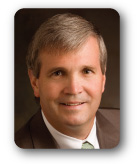In collaboration with CHIME, Becker's Hospital Review's new "Life of a Healthcare CIO" series features leading hospital and health system CIOs from across the country who are sharing their experiences, best practices and challenges.
To recommend a CIO to be featured in this series, please contact Helen Gregg (hgregg@beckershealthcare.com).
An interview with Marc Probst, CIO of Intermountain Healthcare in Salt Lake City. (Interview has been edited for length and clarity.)
Question: You've been CIO of Intermountain for 10 years. How has your job changed since you began?
Marc Probst: It's incredibly more complex. From the changing regulatory requirements to the advances in technology to the greater sophistication of IT users, it's all creating a more complex environment. Not to mention information security — what we see happening with Target and the retail world is something healthcare is now dealing with in spades.
Q: In your time with Intermountain, what has been your biggest accomplishment?
MP: Still being here 10 years later. [Laughs]
I think my biggest accomplishment has been the alignment of what we do in IS with what Intermountain does in the clinical and operations areas. To be effective, we need to work hand-in-hand [between departments], and we've been able to do that very well. Clearly, it's not just me — I've had the pleasure of being at the helm of the IS ship, but it takes a whole crew to make that happen and operational areas that will work through issues with us.
There have been a lot of projects that Intermountain has been involved in over the past 10 years, from developing our electronic medical record system to installing radiology, lab and imaging systems. We tend not to look at these efforts as “big projects”. We look at them as part of our overall operations and what we have to do to be an effective health system. We don't get those rushed, panicky moments, and I think that has a lot to do with our alignment with operations. We work through problems together when they arise. We try to make it better rather than point out each others' deficiencies.
Q: What do you see as your biggest misstep or mistake?
MP: We had partnered with a vendor to make changes to our clinical systems. I'm not blaming anyone, but it didn't work out how we had planned.
It's not a secret, many people know about this project. Basically, it was a very complex problem to solve and it required a huge amount of time and resources, and from my perspective the vendor grew tired of trying to do it with us.
Of course, that's just my perspective. There are many views of problems like this.
Q: Looking back over the past month, what has taken up the majority of your time?
MP: We're doing a Cerner implementation right now, and I'm working on the planning for that and on the alignment of the project with our clinical areas. I suspect this will take up most of my time for a while.
Q: What is the biggest challenge you're facing right now?
MP: Probably information security and privacy. The reinterpretation of HIPAA bleeds over into everything — EMRs, ICD-10.
In 2012, we did an internal assessment following [HHS' Office of Civil Rights'] reinterpretation of HIPAA requirements. We'd always done these assessments and had consistently found ourselves in the top 5 percent in the country in terms of privacy and security. When we received the results of this assessment, however, we found we had a number of areas that needed improvement. In 2013, we launched 72 projects around privacy and security issues, everything from physical perimeter security to new internal policies. We're working on these projects very aggressively; we have a team of almost 30 people focused on just privacy and security, and I suspect this will pretty much continue indefinitely. As the bad guys get smarter, we need to keep getting better.
I also sit on the federal advisory committee [the ONC's Health IT Policy Committee], and what we're trying to do around meaningful use stage 2 takes a lot of emotional, if not physical, energy.
Q: What is one lesson you've learned during your tenure you'd like to share with other CIOs?
MP: It goes back to what we were talking about before — IT is a team sport. There's no way one person or one department can have all the knowledge and information required. You have to be able to work with the whole organization and create strong, lasting relationships to make it work.
I'd also like to reiterate that it's a tremendous time to be in health IT. From all the investments that are being made to the challenges in front of us — it's a great place to be.
More Articles in the "Life of a Healthcare CIO" Series:
The Life of a Healthcare CIO: Mass General's Keith Jennings
The Life of a Healthcare CIO: CIO of the Year Ed Marx
The Life of a Healthcare CIO: Community Hospital Anderson's Joey Hobbs

